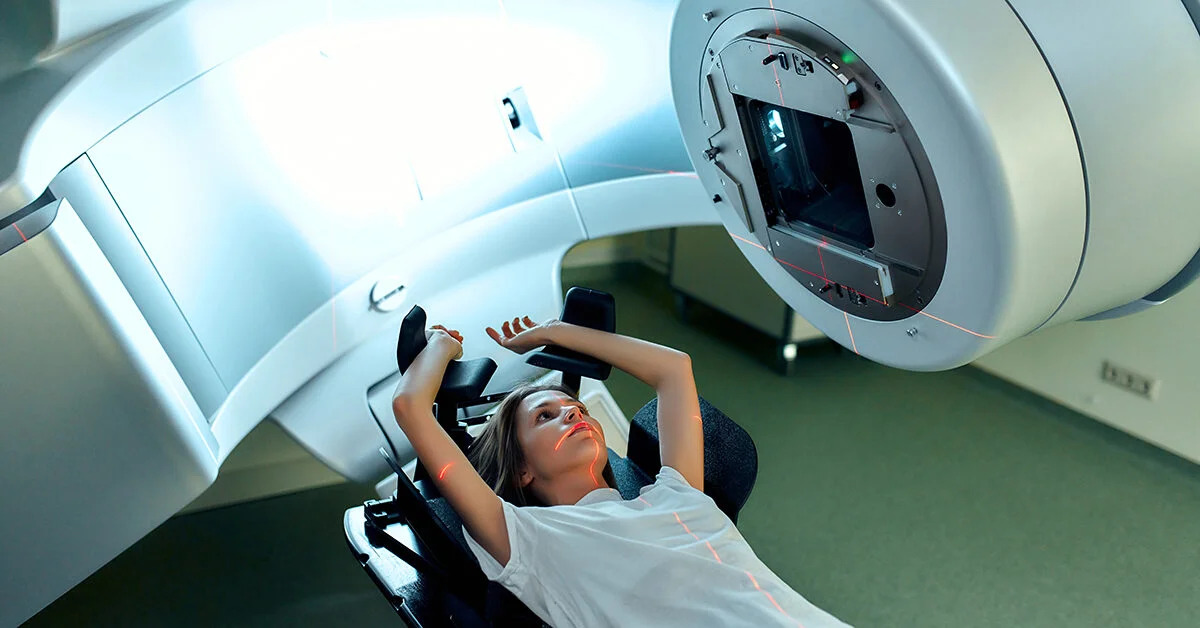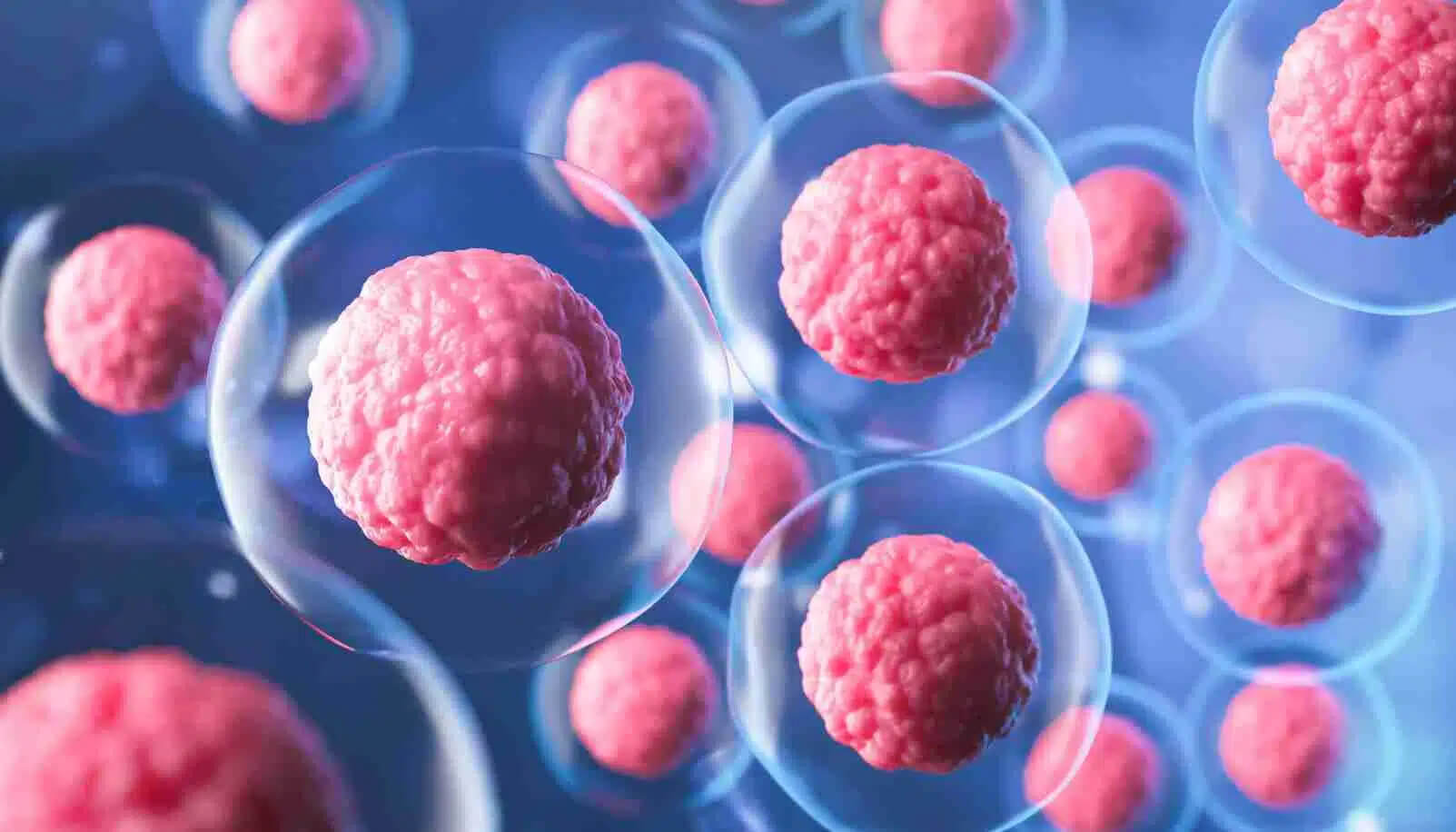
Radiation therapy is one of the most common treatments for cancer. It uses high‑energy beams to destroy malignant cells and shrink tumours. Thanks to modern techniques such as IMRT, VMAT and proton therapy, radiotherapy has become more targeted and safer, but even so it can still cause side effects that affect quality of life and prolong radiation therapy recovery. Early planning of rehabilitation after radiotherapy helps minimise these effects and speeds up return to everyday activities.
Patients often report fatigue during and after treatment. The skin in the irradiated area may become red, dry and itchy; in more severe cases, radiotherapy can cause radiation burns that damage deeper tissues. Nausea, vomiting, changes in taste and appetite loss are also possible. Even with advanced technology, some organs near the tumour receive low doses of radiation, which can lead to longer‑term effects such as fibrosis or nerve damage. Comprehensive support from a multidisciplinary team – oncologist, physiatrist, physiotherapist, nutritionist and psychologist – is essential to address these issues.
How long does it take to recover from radiation therapy?
Recovery time after radiation therapy may vary depending on various factors such as the type and grade of cancer, the type of radiation therapy used, dosage, the general health of the patient, and individual response to treatment. Recovery time may also vary depending on side effects experienced during and after radiationtherapy.
Side effects of radiation therapy caused directly by ionizing radiation tissue damage and general intoxication, such as fatigue and skin irritation, disappear within a few weeks after treatment is completed. However, some side effects, such as difficulty in swallowing or speaking, may persist for several months, and other dysfunctions of the body (incompetence of the anal or urinary sphincter or joint stiffness, etc.) may persist for several months or longer, or even remain for life.

In general, it may take several months or even a year for a patient to fully recover from the effects of radiation therapy in the absence of severe adverse reactions. During this time, patients may need rehabilitation, regular visits to the attending physician and constant monitoring of the patient`s condition.
It is important for patients to follow their doctor`s instructions exactly and attend all recommended follow-up appointments in order to optimize their recovery and perform the correct treatment procedures that will best help manage side effects that occur during and after treatment.
What to expect after radiation therapy?
Many patients are interested in the question of what negative side effects they may encounter and what changes in health at what time can occur in order to be as prepared for such changes as possible. After radiation therapy, a patient can expect different short and long term effects depending on the type, dose and duration of radiation therapy.

Short-term effects of radiation therapy appear during the treatment itself or in the first 1-3 weeks after treatment, these side effects usually disappear. They may include:
- Skin changes — the skin in the treated area may become red, dry and itchy. It can also flake and blister like a sunburn.
- Fatigue. Radiation therapy can cause fatigue, which can range from mild to severe.
- Nausea and vomiting. Radiation therapy can cause nausea and vomiting, especially if the treatment is given to the abdomen or pelvis.
- Hair loss. Most often, radiation therapy causes hair loss in the area where the radiation occurred, but it is also possible that radiation not in the head and neck area still leads to hair loss (but usually to a lesser extent than when irradiating the areas covered with hair) .
- Loss of appetite — radiation therapy can cause sweat eryu appetite, which can lead to weight loss.
- Ulcers in the mouth (usually related to radiation therapy to the head and neck).
The long-term effects of radiation therapy can also appear both during treatment
and 6 months to a year after treatment. These side effects include:
- Fibrosis: Radiation therapy can cause fibrosis, which is thickening and scarring of tissue in the treated area. This can cause stiffness and limitation of movement, or difficulty in subsequent surgery after radiotherapy.
- Malignant tumors caused by radiation. Radiation therapy may increase the risk of developing a new cancer later in life, although this risk is usually small. This is most commonly associated with childhood chest exposure and an increased risk of lymphomas and breast cancer.
- Radiation pneumonitis. Radiation therapy to the chest can cause radiation pneumonitis, which is a more severe inflammation of the lungs than pneumonia.
- Beam enteritis. Radiation therapy to the abdomen or pelvis can cause radiation enteritis, which is inflammation of the small and large intestines.
- Lymphedema, radiation therapy to the lymph nodes can cause lymphedema, which is swelling of the extremities. This also happens with irradiation of the extremities, pelvis and chest.
What can not be done after radiation therapy?
After undergoing radiation therapy, it is important to take care of your health and avoid activities that may interfere with treatment and rehabilitation. The main things to avoid after radiation therapy are:
- Expose the treated area to the sun. Ionizing radiation can make the skin more sensitive to sunlight, so avoiding direct sun exposure is important. Wear protective clothing and use a high SPF sunscreen if you need to go outside during the day, especially during the summer months.
- Do not apply any creams or lotions to the treated area without first consulting your doctor. Some creams or other cosmetics can interfere with the healing process, so it`s important to get your healthcare provider`s approval before applying any product to the treated area.
- Do not scratch or rub the exposed area: Scratching or rubbing can irritate the skin and slow down the healing process.
- Do not take hot baths or showers. Hot water can irritate your skin, so take a warm bath or shower instead.
- Be exposed to excessive physical activity, especially involving the radiation area.
- It is important to rest and avoid any excessively intense physical exercise.
- Smoking and drinking alcohol — these can slow down the healing process and increase the risk of complications. From alcohol at the time of treatment should be completely abandoned, and smoking — if possible.
How to boost immunity and recover after radiation therapy?

Radiation therapy can weaken the immune system, making the body more vulnerable to infection and disease. The main recommendations on how to strengthen the immune system and recover during and after radiation therapy:
- Follow a healthy diet. Radiation therapy patients should include plenty of fruits, vegetables, whole grains, lean proteins, and healthy fats in their diet. These foods are rich in vitamins, minerals, and antioxidants that can help boost your immune system and support your body`s healing process.
- Stay hydrated: Drink plenty of water and other fluids to flush out toxins from your body and keep your immune system functioning properly.
- Exercise regularly. Regular exercise can help improve circulation, reduce inflammation, and boost your immune system. Physical exercise does not mean exercising in the gym, for patients who have undergone such severe treatment as radiation therapy, regular walking or stretching is sufficient.
- Rest. Adequate rest is essential for the body to recover and heal. Be sure to get enough sleep and take rest breaks during the day to recuperate.
- Avoid stress and find your own ways to deal with it. Chronic stress can weaken the immune system, so it`s important to find ways to combat stress and promote relaxation. Meditation, yoga, deep breathing, and other relaxation techniques can help.
- Avoid contact with germs and viruses. You should try to avoid contact with people who are sick, wash your hands often, and avoid crowded places if possible to reduce the risk of infection.
- Attend all scheduled consultations with your doctor. It is important to see your doctor regularly after radiation therapy to monitor your progress and eliminate possible complications.
- It is important to take care of your body and treat other chronic conditions, if any.
What is useful after radiation therapy?
In order to recover faster and feel better, patients should follow fairly simple recommendations, but follow them constantly and consistently. These recommendations include:
- Anesthesia. Radiation therapy can cause a wide range of discomfort from simple discomfort to severe pain in and around the area being treated. Both over-the- counter and prescription pain relievers may be needed to manage this, so care must be taken in advance about which medications will be taken in case of moderate or
severe pain and provided before starting treatment.
- Skin care. Radiation therapy quite often causes irritation and dryness of the skin. It is important to keep your skin clean, dry and hydrated with fragrance-free products. You should also avoid sun exposure and wear loose clothing.
Proper nutrition. A balanced diet with plenty of fruits, vegetables, whole grains, and lean protein can aid the body`s healing process. It is important to avoid dehydration and to avoid alcohol and tobacco use, or to reduce as much as possible if it is impossible to refuse completely.
Side effects of radiation therapy
Radiotherapy side effects depend on the treatment site, dose and individual response. In general, side effects may include fatigue, local skin reactions, nausea, vomiting, diarrhoea or constipation, urinary problems, changes in appetite or taste, mouth sores (after head and neck radiation) and hair loss in the treated area. These issues are typically transient but may require medical management. Some patients experience anaemia or suppression of white blood cell counts; blood tests monitor these parameters. Medical teams implement supportive measures – antiemetics for nausea, anti‑diarrhoeal medication, mouth rinses for mucositis, moisturisers for skin and physiotherapy for deconditioning – as part of radiation therapy side effects management.
Side effects of radiotherapy to the prostate
Radiation therapy is a common treatment for prostate cancer. The side effects of radiotherapy to the prostate are well documented. They usually include:
- Problems with urination. Radiation therapy can cause urinary problems such as frequent urination, urinary urgency, and difficulty emptying the bladder.
- Intestinal disorders. Radiation therapy can also cause bowel problems such as diarrhea, rectal bleeding, and pain during bowel movements.
- Sexual dysfunction: Radiation therapy can lead to erectile dysfunction, decreased sex drive, and difficulty reaching orgasm.
Most urinary and bowel symptoms improve within weeks but some persist longer. Pelvic floor exercises, dietary adjustments (low‑residue diet), antidiarrhoeal medication and sexual counselling help manage these effects. A urologist or radiation oncologist should evaluate persistent bleeding or urinary obstruction.
Side effects of radiotherapy for breast cancer
Radiation therapy is an effective treatment for breast cancer, but it can cause some side effects. These side effects include:
- Skin changes — radiation therapy to the breast may involve high doses of ionizing radiation, so the radiation often causes redness, dryness, and itching of the skin, similar to sunburn. In some cases, the skin may peel or blister.
- Fatigue is a very common complication specifically for breast radiation therapy. Fatigue can range from mild to severe enough to make daily activities difficult.
- Breast changes: Radiation therapy may cause changes in the breast tissue, including shrinkage, hardening, or thickening. The most common occurrence that occurs during radiation therapy of the breast climbs, becomes a seal. It occurs due to radiation fibrosis.
- Lymphedema. Radiation therapy can increase the risk of developing lymphedema, which is swelling in the arm or chest area.
- Discomfort in the chest. Some women may experience chest discomfort, including pain or tightness, during or after radiation therapy.
- Problems with the heart and lungs. Rarely, radiation therapy to the chest can cause heart failure or pulmonary fibrosis, leading to problems such as shortness of breath or chest pain. This complication can be dangerous, so patients undergoing radiation therapy for breast cancer should undergo regular cardiac examinations (ECG, if necessary, ECHO-ECG) and take drugs that reduce the risk of fibrosis.
Side Effects of Radiation Therapy for Colon Cancer
Radiation therapy is standard treatment for rectal cancer, the side effects of such treatment are very unpleasant, but they are leveled by the benefits that radiation therapy provides. Unwanted side effects include:
- Diarrhea: Radiation therapy can cause irritation and inflammation in the digestive tract, especially in the lower parts of the digestive tract, leading to frequent diarrhea.
- Rectal bleeding — Radiation therapy can irritate and damage the tissue in the rectum, leading to bleeding from the rectum. This condition must be monitored, as in some cases it can be life-threatening.
- Violations of urination. Radiation therapy can irritate and inflame the bladder, leading to urinary problems such as frequent urination, urgency (urgency), and pain when urinating.
- Skin changes: Radiation therapy may cause redness, dryness, and itching of the skin in the area being treated. Given the presence in this area (with rare exceptions) of the mucous membrane and constant contact with feces, inflammation often joins the damaged skin. The dynamics in this area must be regularly monitored and reported on all changes to the attending physician in order to prevent suppuration and other surgical complications.
Side effects of radiation therapy for basalioma
Basal cell carcinoma (BCC) is a type of skin cancer that usually grows slowly and
rarely spreads to other parts of the body.
Radiation therapy is one of the methods of radical treatment of basal cell carcinoma (BCC), it is well tolerated and practically does not affect the quality of life of the patient and his lifestyle. However, like any medical treatment, radiation therapy can cause side effects. Some common side effects of CCB radiation therapy include:
- Skin irritation.
- Fatigue. Radiation therapy can cause fatigue that may persist for weeks or months after treatment.
- Hair loss: If the basalioma is on the head or neck, hair loss may occur.
- Changes in skin color — the skin in the exposed area may become darker or lighter.
Side effects of radiotherapy for leukemia
Radiation therapy is often used to treat leukemia, a type of cancer that affects the blood and bone marrow. While radiation therapy can be effective in killing cancerous cells in leukemia, it can also cause significant side effects.
Almost all patients undergoing radiation therapy for leukemia experience at least one of the following side effects:
- Weakness. Many people experience fatigue during and after radiation therapy for leukemia to the extent that it affects their ability to perform daily activities.
- Nausea and vomiting. Radiation therapy can cause nausea and vomiting, especially when directed to the abdomen. In the case of leukemia treatment, radiation therapy is usually combined with toxic chemotherapy as well, so nausea and vomiting are very likely to occur.
- Hair loss. Radiation therapy can cause hair loss, especially if it is directed to the head and neck.
- Decreased appetite: Radiation therapy can cause loss of appetite and weight loss.
Increased risk of infection: Radiation therapy can weaken the immune system, making it more vulnerable to infections.
- Low blood cell count. Radiation therapy can damage bone marrow cells, which can lead to low levels of white blood cells, red blood cells, and platelets. As a rule, this is also a phenomenon that is poorly tolerated by patients, creating a danger to their health and at the same time the main goal of radiation therapy.
- Long-term effects: Radiation therapy may increase the risk of developing cancer or other cancers later in life if radiation therapy has been given to children.
Side effects of radiotherapy for soft tissue sarcoma
Radiation therapy is often used to treat soft tissue sarcoma, a type of cancer that forms in the body`s soft tissues. Specific side effects of radiotherapy for soft tissue sarcoma include:
- Swelling: Radiation therapy may cause swelling in the treated area, especially if the tumor was large or close to the surface of the skin.
- Muscle weakness — radiation therapy can weaken the muscles in the area being treated, which can make it difficult to move or use the affected limb.
- Restriction of mobility. Radiation therapy can cause stiffness in the treated area, especially if it is near a joint.
- Reduced range of motion — Radiation therapy may limit the range of motion in and around the treated area.
- Scarring. Radiation therapy for soft tissue sarcomas often results in scarring in the treated area, which can be permanent.
Side effects of radiotherapy for liver cancer
- Liver cancer is a serious disease, the treatment of which is also difficult to tolerate. Side effects from radiation therapy for liver cancer can lead to serious events such as:
- Nausea and vomiting. Radiation therapy can cause nausea and vomiting, which can be managed with medication.
- Loss of appetite. Radiation therapy can cause loss of appetite.
- Diarrhea. Radiation therapy can also cause diarrhea, which can be managed with medication and dietary changes.
- Abdominal pain. Radiation therapy can cause abdominal pain, which can usually be managed with medication.
- Liver damage: Radiation therapy can cause damage to healthy liver tissue, which can lead to long-term liver damage.
- Radiation-induced liver disease. In some cases, radiation therapy can cause radiation-induced liver disease, a serious complication that can cause liver failure.
Side effects of radiation therapy for uterine cancer
Radiation therapy is often used in the uterus and is a common treatment for uterine cancer and is tolerated differently by different patients. Some women experience severe side effects, some have little or no side effects. These effects include:
- Dryness or vaginal discharge. Radiation therapy can cause vaginal dryness or
discharge, which can be treated with medications or vaginal lubricants.
- Functional bowel changes: Radiation therapy can cause bowel changes such as diarrhea or constipation.
Bladder problems: Radiation therapy can cause problems such as frequent urination or urinary incontinence.
- Sexual dysfunction. Radiation therapy can cause sexual dysfunction, such as pain during intercourse or decreased libido.
- Lymphedema: Radiation therapy can cause lymphedema, swelling of the arms or legs due to a buildup of lymphatic of the patient and begin to differentiate there into those tissues that are damaged. Stem cells «understand» what types of cells to differentiate into by special signals that release damaged tissues.
How long does a person live after radiation therapy?
There is no single answer to this question. Survival depends on the type and stage of cancer, the intent of radiotherapy (curative vs palliative), patient age, comorbidities and response to treatment. For early breast and prostate cancers, five‑year survival rates exceed 90 % when radiotherapy is part of a multimodal approach. For localised rectal cancer, five‑year survival is approximately 70 %. In aggressive cancers such as high‑grade sarcomas or advanced liver tumours, prognosis may be less favourable. Radiotherapy does not shorten life expectancy; rather, it is used to control cancer or relieve symptoms. An oncologist can provide personalised survival estimates based on tumour characteristics and treatment plans.
Rehabilitation after radiation therapy – price
The cost of rehabilitation after radiotherapy varies widely. Factors include tumour type and location, duration and complexity of the rehabilitation programme, country and clinic, whether inpatient or outpatient services are used and whether innovative treatments are involved. A basic outpatient rehabilitation course (physiotherapy, nutrition counselling, psychological support) may cost from $500–$2,000 per month in Turkey or Eastern Europe. In Western Europe or the United States, similar programmes may range from $2,000–$5,000 per month. Inpatient rehabilitation with intensive support can cost more. Insurance coverage depends on the country and policy; many plans cover physical therapy and occupational therapy but may not cover experimental techniques. MedTour coordinators help estimate costs and choose a programme that suits your budget.
Innovative methods of rehabilitation after radiotherapy

Rehabilitation after radiation therapy with stem cells is a new approach to the treatment of radiation-related injuries. Stem cells are undifferentiated cells that can develop into many different cell types in the body. They can repair or replace damaged tissue, making them a promising approach to rehabilitation after radiation therapy.
Our best doctors — specialists
The MedTour team can recommend Dr. Kovalchuk in Ukraine and Dr. Badjin in Serbia for rehabilitation using an innovative method — stem cells. These doctors have extensive experience in stem cell treatment and rehabilitation in a variety of areas and can help organize rehabilitation after radiation therapy in the most correct and effective way.
F.A.Q.
1. How long does it take to see the effect of stem cell treatment?
It depends on the individual condition of the patient and on the clinical situation, but on average, the effect does not appear later than after 2-3 months.
2. How many courses of stem cell treatment are required to achieve the effect?
This issue is also solved individually together with the attending doctor, but as a rule 2-4 courses are required.
3. How are stem cells introduced into the patient`s body?
For rehabilitation purposes, stem cells are administered intravenously.
In order to get more information for consultation with the coordinating doctor of MedTour.





